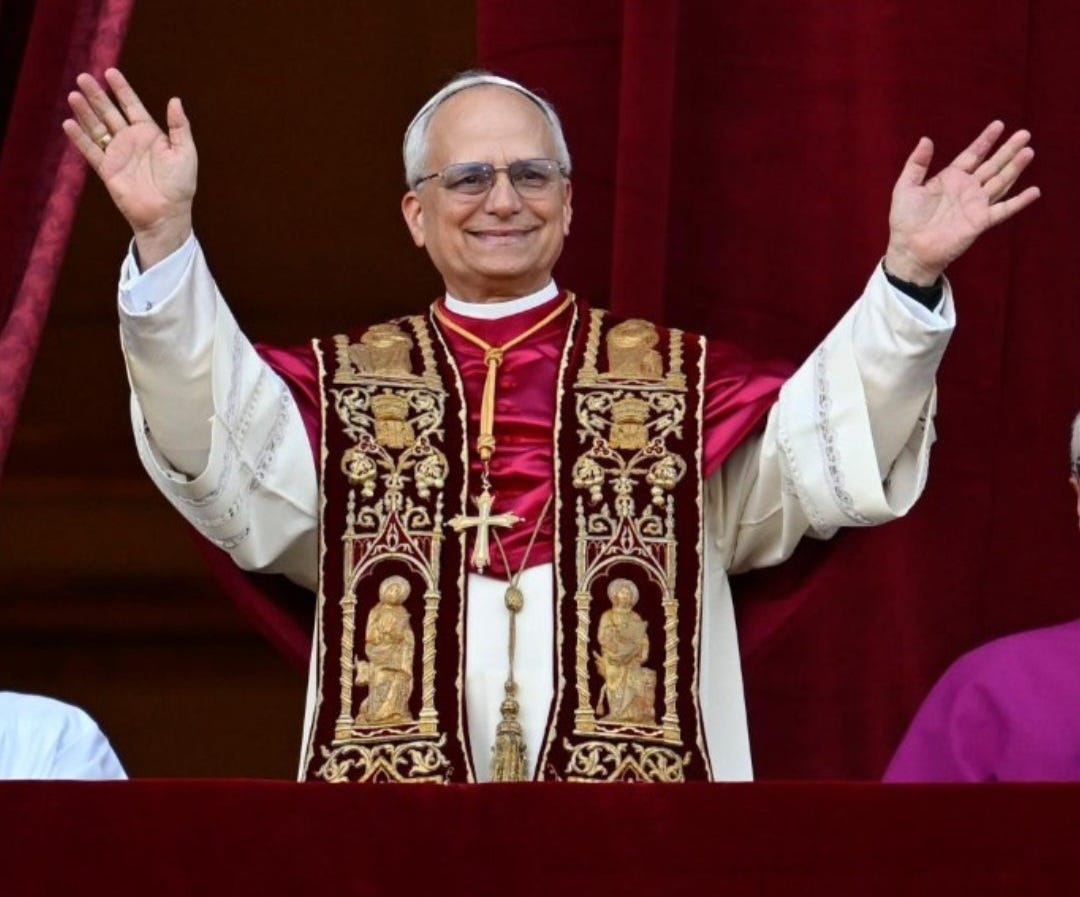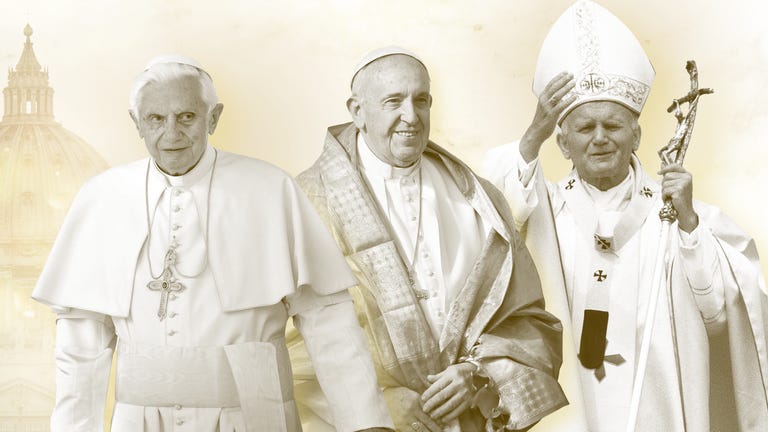When the white smoke cleared over Rome on May 8, 2025, and Cardinal Robert Prevost emerged as Pope Leo XIV, a curious phenomenon ignited across global headlines: confidence. Confidence that this first American pope, shaped by social justice missions in Peru and years of service to Pope Francis, would continue down a predictably progressive path. CNN’s analysts were sure. The Guardian's Vatican correspondent was certain. From San Francisco to Sao Paulo, the consensus emerged with the brisk inevitability of morning fog: Pope Leo would be the second coming of Francis.
Such certainty is comforting. It projects order onto complexity and staves off the anxiety of the unknown. But as with new Popes, so too with new Supreme Court Justices: the moment a human being ascends to an institution of singular permanence, something changes. The script gets tossed. Expectations fade into irrelevance. And the person, now cloaked in the burden of final authority, becomes something different.
Leo himself telegraphed this truth with disarming modesty. Before the conclave, he told his brothers there was no chance he would be elected, particularly as an American. He wasn’t running for anything. He was simply serving the Church. That humility, that detachment from ambition, is precisely what makes the forecasting so absurd. To understand the future of Leo’s papacy, we must begin with epistemic caution: we do not know what kind of Pope he will be. And if history is any teacher, those who claim they do are probably wrong.
Consider Harry Blackmun. Appointed by Richard Nixon in 1970, Blackmun was pegged as a judicial conservative meant to restore restraint to a Court reshaped by Earl Warren’s liberalism. Nixon had campaigned against the very excesses Warren had pioneered. But within three years, Blackmun authored Roe v. Wade. Over the next two decades, his ideological migration was so profound that he would become one of the Court’s most liberal members, defending abortion rights, opposing sodomy laws in Bowers v. Hardwick, and striking down school prayer in Lee v. Weisman. A Justice appointed to end the liberal project became its guardian.
So too David Souter. Chosen by George H.W. Bush as a presumed conservative, Souter quickly drifted left, joining majorities in Planned Parenthood v. Casey, Lawrence v. Texas, and Grutter v. Bollinger. Bush’s regret was palpable. By the time of Hamdi v. Rumsfeld, where Souter voted for due process rights for enemy combatants, it was clear: his judicial soul bore little resemblance to the man conservatives thought they had confirmed.
The lesson here is not that Popes or Justices betray expectations. It’s that expectations misunderstand what happens when men enter offices that strip away factional loyalty and impose fidelity to a transcendent authority. The robes matter. The rituals matter. A Pope, like a Justice, is no longer merely a man with opinions. He becomes a guardian of something larger. His role, insulated from both elections and applause, demands a reckoning with permanence.
That reckoning cuts both ways. Pope John XXIII was elected in 1958 as a placeholder, a 76-year-old compromise candidate expected to gently steer the barque of Peter with minimal disturbance. Instead, he summoned the Second Vatican Council, introduced the vernacular Mass, promoted ecumenism, and issued sweeping encyclicals on social justice. He did not merely reform; he revolutionized. And he did so because the papacy changed him.
Pope Benedict XVI offers a mirror image. Joseph Ratzinger entered Vatican II as a theological liberal, a champion of reform. Yet, disillusioned by the chaos of the post-conciliar years, his papacy emphasized tradition, liturgical dignity, and a campaign against moral relativism. He liberalized the Latin Mass. He reaffirmed orthodoxy. What changed? The office changed him. The very weight of Peter’s keys imposed caution and continuity.
Even those who seem predictable can veer. Pope Paul VI, the architect of many Vatican II reforms, shocked progressives with Humanae Vitae, reasserting the ban on artificial contraception. He upheld clerical celibacy. He centralized papal authority. His legacy is neither wholly liberal nor wholly conservative, but marked by tension between reform and restraint.
Likewise, Chief Justice Earl Warren, appointed by Dwight Eisenhower as a moderate Republican, produced some of the most progressive rulings in Court history. Brown v. Board of Education dismantled segr
egation. Miranda v. Arizona codified rights for the accused. Loving v. Virginia ended bans on interracial marriage. Eisenhower, it is said, called his appointment “the biggest damn fool mistake I ever made.” Yet Warren became Warren because the institution demanded it.
And now we have Amy Coney Barrett, heralded as a linchpin of Trumpian conservatism, whose recent dissents, particularly in the Alien Enemies Act and USAID cases, have drawn ire from the right. Joining Sotomayor in advocating broader due process for Venezuelan deportees, upholding congressional foreign aid against executive discretion, she has defied MAGA orthodoxy. Barrett was not appointed to surprise, yet surprise she has.
All of this brings us back to Pope Leo XIV. His biography, while compelling, does not dictate his destiny. His American roots, his missionary service in Peru, his humble demeanor, his affiliation with Francis, none of these foretells his future governance. Already, he is being cast as a liberal successor. But the very act of ascending to Peter’s Chair may temper that narrative. He has signaled openness on women’s roles, yet ruled out female deacons. He dons the red cape Francis shunned. He tweets like a millennial, yet prays like a monk. And, as a lifelong Chicagoan, he cheers for the White Sox, not the Cubs, a fact that may say more about his patience for suffering than any position paper ever could.
Some will say this proves he is a moderate. Others, a progressive in traditional garb. But perhaps the truth is simpler: he is Pope now, and that changes everything.
Those who declare the future course of his papacy are not reporting. They are projecting. For every prediction of a Francis redux, there is a ghost of a Blackmun, a Warren, a Souter reminding us that certainty is for pundits, not prophets.
The conclave does not elect a program. It elects a man, and the man becomes something else. Just as the robes of the Supreme Court bend the spine of the jurist toward fidelity to law, so too the vestments of the Bishop of Rome pull the soul toward the mystery of stewardship. That stewardship has no algorithm.
We do not know what kind of Pope Leo will be. And that is not a problem to be solved, but a truth to be embraced. As with all great offices, the seat transforms the man, not the other way around. Those who pretend otherwise mistake the appearance of trajectory for the reality of transformation.
Wait. Watch. And be wary of those who claim to know. History is clear. The robes have their own logic.
If you don't already please follow @amuse on 𝕏.







See you and raise you: The most thoughtful analysis that I've yet read. It has a seeing-the-naked-emperor sort of vibe. Which means that it won't be popular.
What a wonderful essay. Thank you.